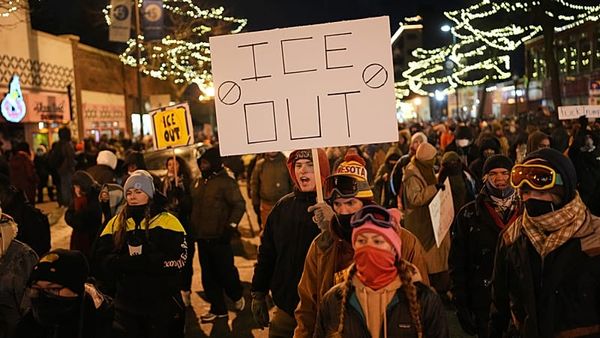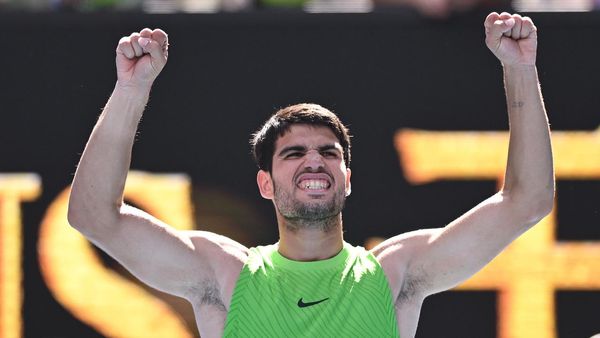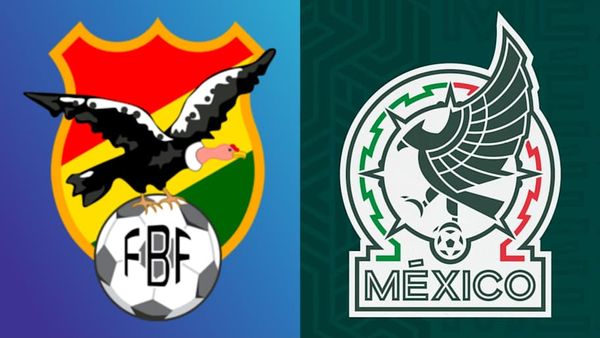
The police had reclaimed O’Connell Bridge and were preparing a baton charge on the south side of the River Liffey, but the rioters and bystanders on Westmoreland Street did not want to retreat and lose their view of the fires.
A masked youth had just ignited a bin, which had erupted with a great whoosh and engulfed a bus stop in front of Mimi’s Coffee. On the far side of the bridge, a doubledecker bus and car blazed at the foot of the statue of Daniel O’Connell, shooting orange flames. Smoke from other fires plumed into the night sky.
The police hammered their batons on their shields, a prelude to another charge, and still the crowd lingered, almost hypnotised by the spectacle of flames in the heart of Ireland’s capital.
“It’s sad it’s come to this,” said one man, a soft-spoken spectator in his 20s, not a rioter. “But the situation has got out of control.”
He was referring not to the riot consuming central Dublin on Thursday night but to immigration, and a perception that foreigners – and especially asylum seekers – were driving a crime wave and worsening a housing crisis.
“Their religion has no respect for women’s rights,” he added. “The men are dominant.”
The police charged and the spectator fled, unable to elaborate about any affinity with Dutch voters who last week backed Geert Wilders’s anti-Islamic Freedom party, or with other election results across Europe, but there was little need.
Amid the fumes and shouts and sirens blazed an uncomfortable truth. The Ireland that for so long had seemed to buck Europe’s anti-immigrant trend and offer a “thousand welcomes” to the foreigners who reshaped its economy, society and demography – the Ireland that seemed immune to xenophobia and demagoguery and backlash – was not so different after all.

Immigrants started coming in numbers here in the 1990s, to the point that today a fifth of Ireland’s 5 million population was born elsewhere – a seismic transformation that appeared to unfold seamlessly, and with negligible public debate and little political impact.
While anti-immigrant sentiment swelled in France, Italy, Hungary and other countries, and gave Brexit its impetus, Ireland seemed impervious. Immigration barely featured in elections or parliamentary debate or in mainstream media. The rise of Sinn Féin, a progressive leftwing party, did not upset this consensus.
Theories abounded about Ireland’s exceptionalism. Perhaps centuries of emigration and colonialism made the Irish empathetic with arrivals seeking a new life. Maybe it was the booming economy’s hunger for labour, albeit punctuated by a crash and austerity. Maybe the Irish were just naturally welcoming and relaxed. More Poles, Brits, Indians, Romanians, Brazilians? Ah sure it’s grand.
Events on Thursday lit a bonfire under such pieties. At about 1.30pm, a man stabbed three children and a female carer outside a primary school in Parnell Square in central Dublin, seriously injuring two of the victims. It was a shocking attack, and within hours all hell had broken loose.
Social media commentators outed the alleged assailant as a foreigner – in fact he is a naturalised Irish citizen, reportedly from Algeria – and summoned a violent protest.
“They can’t control us all,” said a voice message from an account called Kill All Immigrants. “Let’s have little groups splintering off, doing what we got to do. Seven o’clock, be in town. Everyone bally up, tool up. And any fucking gypo, foreigner, anyone, just kill them,” said the voice. “Let’s get this on the news, let’s show the fucking media that we’re not a pushover. That no more foreigners are allowed into this poxy country.”
The bloodcurdling threats were bluster. Some rioters chanted “get them out” and other slogans, but there were no reported attacks on foreigners. Instead, about 500 people rampaged through central Dublin, targeting property and police. By the end of it, a tram and two buses had been torched, 11 police vehicles damaged, 13 shops looted, 48 people arrested and dozens of officers reportedly injured.
Immigrant groups expressed concern about their security. The Muslim Sisters of Éire, which runs a soup kitchen in Dublin, suspended its service. The Movement of Asylum Seekers in Ireland said that no matter what an individual did, no nationality should be tarred: “No human being is responsible for the actions of another, even if it is their twin.”
On Friday, Leo Varadkar, the taoiseach, invoked an Ireland of tolerance. “Being Irish means more than saluting the tricolour, beating your chest, and pointing to where you were born,” he said. “It means living up to the ideals represented by our flag, it means being true to our own history, it means acting with compassion for others. Today I call on us all to remember who we really are.”
The riot has scorched the notion of some progressive Celtic nirvana in the Atlantic. Not because of its scale: the mob included opportunists more interested in carting off trainers and vodka, or recording dramatic footage, than intimidating the foreign bystanders who watched, agog. Factors unrelated to immigration, such as the growing boldness of youth gangs since Covid lockdowns, also fuelled the chaos.

Nor did the violence have public support. It has been widely condemned. And many have highlighted the fact that it was a Brazilian Deliveroo rider named Caio Benicio who helped to stop the attacker outside the school.
A GoFundMe campaign to “buy Caio Benicio a pint” has drawn more than €330,000. “Welcome to Ireland Caio! Thank you for making it home,” said one donor. “What you did was brilliant, stepping in without a thought for yourself, go raibh maith agat,” said another, using the Irish for “thank you”. “A foreign hero,” said another.
Yet the lightning bolt that struck Dublin has not come from a clear blue sky. Concern about immigration and asylum seekers has been clouding villages, towns and cities across Ireland for several years. In 2019, a hotel in County Leitrim that was in line to host asylum seekers was set on fire – twice. Suspected arsonists have targeted other refugee centres. Raucous protests have blocked roads and, in September, even parliament, briefly trapping legislators inside.
Peaceful protests against planned or actual accommodation centres happen almost weekly, often led by middle-class residents seeking court orders. Days before the riot, hundreds of people in Rosslare gathered to oppose plans to turn a second hotel in the County Wexford village into refugee accommodation. Legislators now openly vent such concerns in parliament.
Some protests focus on resources. The number of refugees housed by the state jumped from 7,500 in 2021 to 73,000 in 2022 amid a housing shortage and the cost of living crisis.
However, rightwing activists have also fomented moral panic about a country overrun with “non-native” predators such as Jozef Puska, a Slovakian man convicted this month of murdering a teacher, Ashling Murphy, in 2022. Placards bear slogans such as “Ireland is full”, “Ireland for the Irish”, and “Irish lives matter”.
Drew Harris, the Garda commissioner, or police chief, said far-right radicalisation would continue to disrupt Irish society: “We have to make the assumption that we’ll see further such protests.” The force has hastily borrowed two water cannon from the Police Service of Northern Ireland.
Boris Johnson, writing in the Daily Mail, said even the “most achingly liberal of countries” were now chafing at open EU borders. “Look at what is happening in Dublin, where that lovely and happy city seems to have been engulfed by race riots.”

Hermann Kelly, the founder of the fringe Irish Freedom party, condemned the violence but said an underclass felt disconnected and ignored: “They are just angry and they don’t see a mechanism where they can exert change.”
Kelly, who works in the European parliament for conservative Romanian MEP Cristian Terheş, said he planned to run three candidates in next year’s MEP elections.
It remains to be seen whether the far right gains an electoral foothold in Ireland. From Slovakia and Spain to Germany, Poland and Italy, populist and hard-right parties have triumphed in some EU member nations and faltered in others.
Voters may have to hold their breath for months to see if Wilders becomes prime minister due to the protracted coalition-formation process in the Netherlands. But the French finance minister, Bruno Le Maire, said the election victory for the Dutch anti-EU and anti-Islam candidate had been a consequence of “all the fears that are emerging in Europe” over immigration and the economy.
All over Europe, there are signs that anti-migration policies are appealing to some voters. The far-right AfD party in Germany has declared itself a “major all-Germany party” after success in regional elections in the powerhouse state of Hesse in October. In Spain, the far-right party Vox entered local government in several regions in June.
Giorgia Meloni swept to power in Italy last year on the back of anti-immigration policies. Despite the distaste many in the EU feel, she is now one of the single most powerful leader at EU summits when it comes to the new migration laws member states are trying to get over the line after seven years of disagreement.
She is feted by leaders including the head of the European Commission, Ursula von der Leyen, and Dutch prime minister Mark Rutte, who accompanied her twice on a migration policy trip to Tunisia. Even Emmanuel Macron joined the club last month after joining a meeting between Rishi Sunak and Meloni on migration.
“The danger is, if Meloni can become central to European politics and [voters] see World War III hasn’t started just because a populist leader is in power, they might say ‘why not?’ in France and give Marine Le Pen a shot,” said one diplomat in Brussels. The diplomat predicted migration would remain top of the agenda, paving a lurch to the right in Europe’s parliamentary elections.
Clinging to the conceit that Ireland is different was no longer tenable, wrote Pat Leahy, the Irish Times’ political editor: “Whether you think these concerns are legitimate or not, they are real, and they are now part of our politics.” A government figure sent Leahy a wry text: “So we’re officially a mainstream European country now.”







